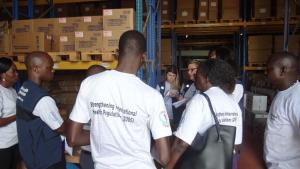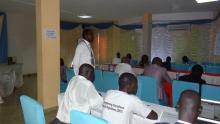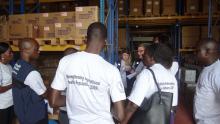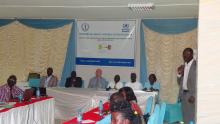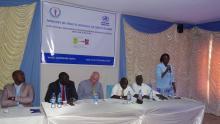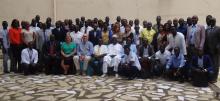South Sudan conducts Joint External Evaluation of Core capacities for International Health Regulation (2005)
20 October 2017, Juba – As a strategy to strengthen the country’s capacity to prevent, detect, confirm, and rapidly respond to public health risks and save lives, South Sudan conducted a Joint External Evaluation (JEE) for International Health Regulations (2005) from 16-20 October, 2017 at Juba Landmark Hotel. This is in-line with the IHR monitoring and evaluation framework. South Sudan is the 26th country to conduct the JEE process in the WHO Africa Region.
The JEE exercise facilitated by external evaluators lead by Dr Ambrose Talisuna, WHO Regional Advisor for Health Security and International Health Regulations for Africa, involved a multi-sectoral team of stakeholders. Participants were drawn from Ministry of Health (MOH), Humanitarian Affairs and disaster management, Livestock and Fisheries, Interior, Petroleum, Environment, Wild life and Tourism, Ministry of Justice and Constitutional Affairs, Urban Water Corporation, Civil Aviation Authority, Food and Agricultural Organization (FAO), UNICEF and International Organization for Immigration (IOM) held fruitful discussions. In the context of the one health, the multi-sectoral approach is imperative as risks to public health can emerge from humans, domestic and wild animals/livestock and/or from food, chemical and radiation events.
In his remarks, Dr Allan Mpairwe WHO Emergencies Coordinator, on behalf of Mr. Evans Liyosi, the WHO Representative a.i. for South Sudan, emphasized the importance of the JEE process noting that IHR remains a priority for member states to strengthen their capacities to detect, prepare, prevent, and respond to public health threats. The process will provide a baseline that will foster development of a costed national multi-hazard preparedness and response plan, Dr Mpairwe underscored. This plan will also be used as a resource mobilisation tool to enhance national public health security. He reaffirmed WHO’s commitment to continue supporting the country to strengthen mechanisms to respond promptly to public health threats and enhance national public health security.
South Sudan has experienced a number of outbreaks, the most recent being the mixed arboviral outbreak in Aweil and the cholera outbreak in 26 counties. These have all been managed in accordance with the IHR framework. The mixed 2016 arboviral outbreak in Aweil was detected, investigated, and notified to WHO inline the IHR decision making instrument. However, the country is working to enhance capacities for event-based and laboratory-based surveillance, ports of entry, chemical and radiation emergencies, zoonotic diseases, biosafety and biosecurity and anti-microbial resistance.
‘All neglected tropical disease are here in South Sudan, we need to develop a system to control these diseases which do not respect boundaries’ emphasised Dr Samson Baba, Special Advisor to the Minister of Health. Others who made remarks included Hon Dr Luka Munoja, Hon Dr Alma Jervas, members of parliament; Mick Robson Obe, Head of Operations Health Pool Fund, Mr Gatwech Kulang Under Secretary Ministry of Humanitarian Affairs and Disaster Management, who commended the efforts by MOH, WHO and partners in strengthening the country’s capacity to detect and respond to humanitarian emergencies.
The JEE team assessed the country’s current capacity, specific status and progress in achieving the targets in the JEE tool, and the findings will guide development of a costed national action plan along the 19 technical areas for the implementation of IHR (2005) in South Sudan. The JEE team visited facilities like Al-Sabah children’s hospital, Gurei primary health care centre, few selected Public health care centres, the National Public Health Laboratory, the Emergency Operations Center (EOC), Juba Teaching hospital, Nimule border post, Jubek state Ministry of Health surveillance unit, the Central Medical Stores (CMS), and WHO warehouse to validate the findings presented in the JEE self-evaluation report.
The Joint External Evaluation (JEE) is a voluntary, collaborative, multi-sectoral process to assess country capacities to prevent, detect, and rapidly respond to public health risks whether occurring naturally or due to deliberate or accidental events. The JEE tool and process are key components of the World Health Organization (WHO) International Health Regulations (IHR) Monitoring and Evaluation Framework and have been developed and implemented in full concordance and collaboration with related efforts such as the Global Health Security Agenda (GHSA) and the World Animal Health Organization’s (OIE) Performance of Veterinary Services (PVS) Pathway.
Email: mpairwea [at] who.int (mpairwea[at]who[dot]int)
Tel: , +211 955 372 370
Tel : +211922135555 or +211916097828
Email: ramadano [at] who.int (ramadano[at]who[dot]int)



